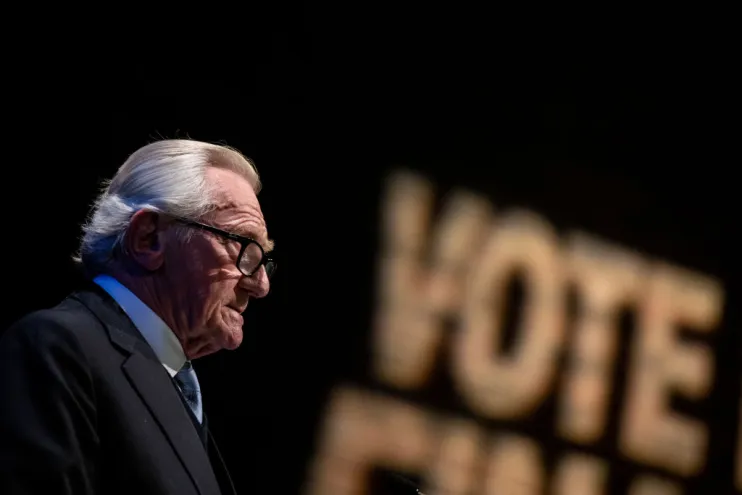Michael Heseltine: Hung parliament better than Conservative majority under ‘flexible’ Boris Johnson

If this election has proved anything, it’s that political allegiances aren’t what they used to be – not least when it comes to those normally found sitting in parliament.
Which is why I find myself speaking to Tory grandee, former frontbencher and Conservative peer Michael Heseltine about his decision to back the Liberal Democrats over the biggest issue he still thinks the country faces since the 1940s.
Read more: ‘It was very personal, very hurtful,’ says ex-rebel Stephen Hammond
Heseltine is endorsing Monica Harding, the Lib Dem candidate for Esher and Walton, against foreign secretary Dominic Raab. Although the incumbent is sitting on one of the healthiest majorities in the country, Harding is snapping at his heels and Heseltine’s endorsement could tip more votes in her favour. But how can he be sitting in the Lords for one party while actively backing another?
“I would never leave the Conservative party. That doesn’t mean to say every word, every speech, every member I agree with,” he says.
“The difficulty in this issue of loyalty is this – what happens if you have said something all your life politically, and every leader in that party has said something similar, what happens if your party shifts? I can’t follow them. I can’t accept that we make this country poorer, less powerful, less influential.”
Although Heseltine shies away from outright calling his friend and one-time colleague Boris Johnson a liar, he comes close to it by arguing “people were deceived” by the Vote Leave campaign.
“All those claims about millions of Turks coming here, about the piles of money for the health service. These were deliberate deceptions,” he says.
Heseltine dodges broader questions about the Prime Minister’s character in light of the ongoing hospital row, as well as his trustworthiness. But he insists Johnson is ultimately a liberal Tory who made a “calamitous” decision to back Brexit.
“It was a career choice, a bad one in my view, but I am not prepared to get into the business of slagging someone off – although I will say he is one of the most ‘flexible’ politicians I’ve known.”
Read more: Nickie Aiken – Change is coming to Two Cities
Another question Heseltine would rather avoid is the threat Labour poses, particularly with several former Tories either standing as Lib Dems or independents, most of whom now look likely to lose their seats.
“Don’t let’s spend even a minute discussing Corbyn’s programme, which would be a monumental disaster, but for its one great asset – that it’s not going to happen”.
Heseltine believes there is “no chance” of a Labour government. “All the ‘reds under the beds’ warnings reveal is how worried [the Tories] are about their own side of the argument,” says the former frontbencher.
“He’s no risk at all because he’s not going to win. It’s a diversion – an attempt to scare people into making the wrong decision. Any commentator who is looking at the polls knows Mr Corbyn is not going to be Prime Minister.”
Read more: Greg Hands – Vote Lib Dem, get Labour
But the polls are suggesting there could be a late Labour surge just as the Lib Dems start to fall away. What does the man with 35 years’ experience in the Commons think about Jo Swinson and her team’s campaign?
“They were probably unwise to put revoke at the forefront,” he admits. “The only way they could have done that, given they were never going to get a majority, was through a second referendum.”
Far from a Lib Dem majority, the most likely options now are either a slim Conservative majority or another hung parliament. Would that really be a good idea, after the stasis of the last three years?
“It’s a much better outcome than a majority for Brexit because it would lead to a second referendum,” Heseltine says. It would “remove uncertainty far faster than the Brexit deal Boris has negotiated” because of the “very wide body of options” that comes with the UK’s future relationship with the EU.
Debating this deal will bring “a year of total unpredictability as all the details are explored” whereas a second referendum could be concluded within that time. “Then you can go for parliamentary scrutiny,” he says.
But surely I ask, after all this time, it’s right that progress is made? Heseltine disagrees.
“If you are standing at the edge of a cliff, it’s quite a lonely, dangerous place to be. But if you jump over the edge it’s a damn sight more dangerous – with certain predictable consequences.”
Main image: Getty